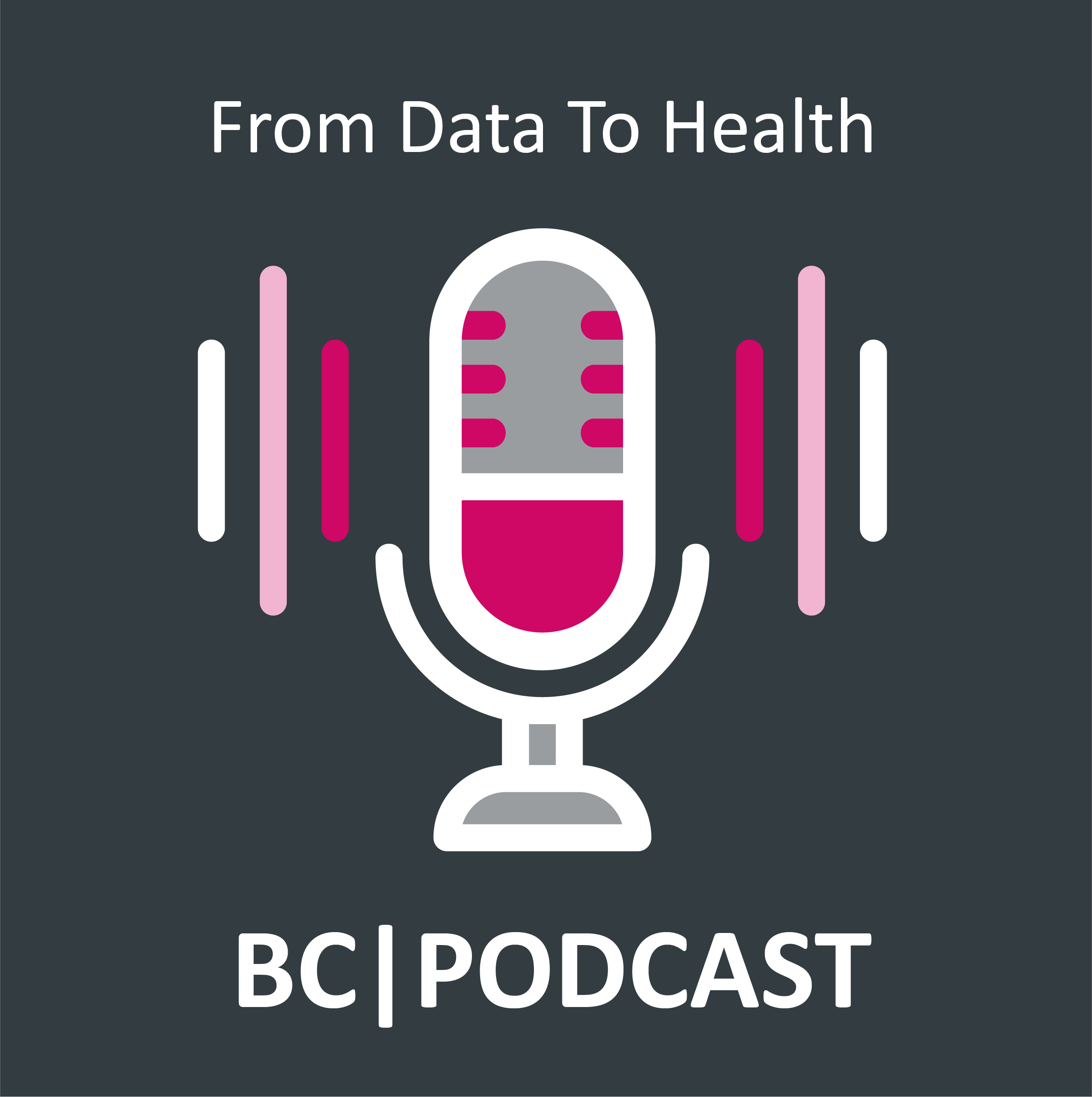Today's podcast will focus on the topic of the journey to safe and secure global data access. This podcast sheds light on industry challenges and expectations as well as innovative approaches to collaboration. The discussion is led by Tõnu Esko, BC Platforms SAB Chairman and Vice Director of the Institute of Genomics University of Tartu, where he also holds a Professor of Human Genomes position. He is head of the Estonian Biobank Innovation Center, and focuses on public private partnerships and innovation transfer. Dr. Esko is also a research scientist at the Broad Institute of Harvard and MIT. He acts as one of the senior leaders for Estonian personalized medicine programs and serves as a scientific advisor for several companies. Our speakers today are Jennifer Cubino and Anni Ahonen-Bishopp from BC platforms. Jennifer Cubino is a BC Platforms COO, Customer Success and Data Science. She has many years of experience as a clinical research industry executive, most recently at IQVIA/Quintiles. She has a diverse background, including creating and leading strategic partnerships, clinical trial operations, business strategy, precision medicine, technology development and oncology. Her focus is developing high performing and engaged teams capable of tackling rapidly changing markets. With seven years of experience as a former IRB member at Tufts Medical Center, Jennifer has a deep commitment to patient well being. She has numerous posters and publications on the topic of integrating NGS into clinical research and has presented at international conferences on enhancing executive leadership skills. Jennifer holds a Bachelor of Science from Cornell University, College of Agriculture and Life Sciences and a Master of Arts in clinical research from Boston University College of Medicine. She is a certified LSS greenbelts and certified clinical research associate. Anni Bishop has held several positions at BC platforms before being appointed as Pharma and Research Solutions Director. She first worked as a science expert and leader as a project manager and team leader. Miss Anni Bishop has extensive experience in science communications, software design, product development and management of both large customer projects and international cross disciplinary collaboration projects. Prior to joining BC platforms, Miss Anna Bishop was a hobbyist programmer working for her PhD. Her doctoral dissertation was about the modulation of growth factor activity in the brain. After 10 years in the biochemistry lab, she joined BC Platforms in 2006 to combine her expertise in bio sciences with her knowledge of IT and software in laboratories. Miss Anni Bishop holds a PhD degree in molecular neurobiology from the University of Helsinki. Now, I will hand over to the speakers for a brief intro to begin the discussion.
Tõnu Esko 3:29
Hello, I'm Tõnu Esko. I'm happy to be the host of this podcast and together with Jen and Anni.
Jennifer Cubino 3:36
Hi, Jennifer Cubino. It's wonderful to be with you today.
Anni Ahonen-Bishop 3:41
Hello, everyone. This is Anni Bishop. I'm very happy to be a part of this discussion.
Tõnu Esko 3:46
So without further ado, let's kick off this discussion about the journey to safe and secure global data access. As an academician, I know that it's quite burdensome and time consuming to get access to data of other data custodians. But they are focused on the more challenging aspects of an industry to get access to different datasets. And as we already know from the previous podcast discussions, the healthcare data is very often siloed. There are many layers of data protection, security and basic pressure requirements. And so today we will focus on the industry view and try to understand what are the burning challenges for pharma to access data. So maybe, can you kick off your view on what are the main challenges to keep industry from this very insightful data resource?
Jennifer Cubino 4:47
Yeah, Tonu, it's such a crazy time right now, with the poll that's happening in the market. There's a greater and greater need for real world data access globally. It's becoming more critical for faster decision making and reducing the R&D spent. Pharma needs to reduce the risk of what drugs they promote through the R&D pipeline, and real world data helps them hone in and make better decisions sooner. So it's critical for them, and they need to have it. At the same time globally, we're seeing a trend where there's the expectation for stricter and stricter data security. And I think that trend will continue. Patients around the globe want to know what their data is being used for, they want to know that good is coming out of it, they want to consent for data to be used. And so we see this stricter compliance at a time when pharma is really needing greater knowledge and information that comes from the data. And it's really putting stress on the industry, for how we meet the needs. It feels very polarizing at times. But there actually is a good clear path forward for how we can enable solid drug research while still protecting privacy with patients. Further when you start to look at the quality of data that's needed, for real world data, the gold standard is what we collect in clinical trials. It's highly controlled, the data are very clear, a patient population is highly segmented for the exact type of patient that you think may benefit from the treatment. When you're looking at real world data, and patients are not as segmented in their standard clinical care, as well, you have missing data points, they're just not collected in these patient populations. And so helping to find the best path where you can have the greatest benefit from the real world data that you're operating under the global privacy framework that exists around the world. This is where, you know, we work every day at BC platforms. These are the challenges that we try to work through to help balance the needs of the data providers as well as the pharma researchers.
Tõnu Esko 7:07
Thanks Jen, it's important to emphasize in all those aspects that you actually bring out, that there is a rising interest from the industry side for the different datasets. But Anni maybe you can add on your view, on the technical side, what Jen brought out in organisation is very important data quality and the privacy preserving nature of analytics, like how those challenges could be approached or managed.
Anni Ahonen-Bishop 7:38
Yes, so, from the technology point of view, obviously, we drill world data. We are talking about very diverse data sources, dispersed data sources, very fragmented and falling under multiple different administrations, administrative models, regulatory landscapes and so on. So, the technology challenge there is in the ability to bring this all together so that, even though we have fragmented data silos and their custodians obligations can be very different, they would still be able to ensure control and secure sharing plus provide the benefit of having that access to multiple different data locations without losing usability of data. So harmonization across these different data silos - data model harmonization, becomes very important. And when we are talking about fragmented technology and regulatory landscape, we also have to understand that that also means that these silos are smaller, which pretty much translates directly also as often lack of resources. So, data custodians who are sitting on top of relatively often very, very important data compartments or generic health data, rare disease data and so on, do not necessarily have the resources to have all of their data collections, so that it would be technologically possible to combine these data silos together. So, technology challenge is definitely about harmonizing, bringing this different custodians collections together in such a way that each custodian still has full control over who has access to the data, how it is to be used, to be exploited, by whom, when, and that they are able to have this kind of full control - pull the plug, if they do not feel that they are comfortable with the use of the data. So this I find the largest issues in the technology side.
Tõnu Esko 10:02
Thanks, Anni. And I know from my own experience, it's actually quite time consuming to answer all those different inquiries about the data, the data types, what we have in the biobank, the access rules. And whereas Estonian Biobank is very much positioned, very well positioned on this type of interactions, many data sources, as Anni brought out, those rare disease collections may not be well positioned. And I've been working with BC Platforms now for almost five years and, and have found it very helpful to have a partner that helps to structure, but also in the forefront of interaction with the industry. So Jen, maybe you can give an overview of what kind of help these platforms can provide different data custodians, in interaction with industry and making the data more readily available.
Jennifer Cubino 11:11
I think it's a challenge connecting industry with the data custodians. We call them data nurses at BC platforms. When you're trying to make data available, when you're trying to share it, there are local requirements around how the data can be used. And we work under GDPR, which is fine with specificity of use for the data. And because of that, we make requests of the data specific to the research questions and to our data partners. It helps them evaluate their rights and what they can use for the data under that specificity of use. And while GDPR isn't a global legislation, it is very much recognized as a gold standard. And so this is why we operate under that because typically breather at or very close to the local legislation, when we take those assumptions. For our customers, the pharma companies, really, they have such nuanced and specific needs. You know, lately, we've been seeing a lot of requests around NASH data, which is a really hot topic. And NASH is an interesting case to look at, because there's not a clear ICD code or designation for when patients have NASH. It's kind of a compilation of different symptoms that go to this NASH phenotype that we see. And when you're looking at understanding NASH and different global patient populations, having that knowledge of how these patients are treated and diagnosed, and what tests as normal and under standard of care, becomes really critical to then bring that back and create an umbrella to understand and be able to draw conclusions from this. And so we work with our Global Data Partner Network, to help them understand their data, help them answer very specific questions typically related to standard of care and data usage, and compile it all together so that the pharma researchers can really have an understanding of the depth and breadth of the data that they can access and what research questions or bad statistical power they could have with doing a research study. Further, we often have to spin up different architectural environments, which Anni can talk about even in greater detail, that ensure that the technology supports the data security and privacy adherence that we require in that local environment. And so we leverage the strength of our technology and architecture in order to do that. So Anni if you want to add in there.
Anni Ahonen-Bishop 14:00
Yes, so definitely, the diversity of different technology environments is a huge thing here. And I think a major part of any technology solution trying to tackle these problems is the ability to operate in different kinds of environments. And it is not just a technology restriction of which data partners or data custodians are able to operate and what kind of a technology platform, it is also a regulatory question. So, many national bio banks, for example, have worries they are wary of using some multinational service providers to rely on for example, cloud resources, computing resources, storage and so on because they're legislative environments. The regulatory environment is not familiar to them. They are not necessarily happy with who has the keys and who has the control. So any technology solution needs to be able to operate in a very large variety of different environments, and not just stick with one technology solution or technology platform. And then on top of that, we do need to embrace many different standards. So globally, different data custodians rely on different data sources, and these data sources operate on varying numbers of data standards. And to even start tackling that problem, you need to be able to adopt something that's universally accepted closer to truth, if not the whole truth and start from there as they're building up on top of that. What we have, for example, found that collaborative projects, like OMOP common data model, are actually very good in the sense that they're bringing variety of different types of standard experts together and build maps between vocabularies and basically build a data structure that then allows this kind of communication from one, one data collection to another, and then back to the researcher. So all about being open about different standards and about different technology environments. And I think any solution here must, must follow this, you cannot force all data custodians globally, into the same mold that is not going to be helpful or productive. You need to be able to be flexible.
Tõnu Esko 16:36
Thanks, Anni. Yeah, I really liked that you brought up this OMOP data model that relies more on the platform side, rather than the custodian side. So the data custodian is going to have the data, whichever format they are used to, or have been this model of operation. And then the platform or analytics side can just take the OMOP model, and then try to harmonize everything, when those were really valuable insights. But now if we think about how to really accelerate global data, data access, and what, in your mind, should pharma and biobanks do to have more of this type of collaborative projects around data so that the privacy is preserved and always under legal and ethical framework? So Jen, maybe what would be your recommendations to pharma and biobank partners to really build this type of partnerships?
Jennifer Cubino 17:45
Yeah, I have advice from both, you know. With us operating and connecting researchers between pharma and our data partners, we regularly see the changes that are needed to help enable deeper research. For data partners, really making sure that they have clear consent and data use policies and a process to follow to apply for data usage and to confirm that they have the rights to use the data. The most valuable data is longitudinal, where you can see patient outcomes and understanding of that, combined with genomics, laboratory values, seeing how the patient is changing with the particular conditions that they have. All of that drives real importance in research. And so, knowing what they have and having clear policies for it to be accessed and understanding that mechanism is really important. For our pharma partners, what we see here is that the US data access model has really dominated how pharma thinks about data access. So they're operating under a mindset of these large data sets that are highly aggregated and are being used and purchased, just on a broad scale. So ICD codes, pharmacy, medication type, data reimbursements, that type of thing. And that really doesn't expand beyond the US, HIPAA is a very local standard, but really helping our pharma customers to understand that you're not purchasing data, you're paying a usage fee, and you utilize data for the research questions, but the data ownership stays with the data partners. It's really helping to understand that model and that difference, because it's in this data usage and data access model that you really can access data globally, versus this paying for large datasets, which is the US market that really isn't globally scalable. So I see pharma needing to work through that. In how they're looking at their real world data strategy and how they start to take decisions around that.
Tõnu Esko 20:07
Thanks, Jen. And I really like how you phrase this conceptual difference between US healthcare data and European one, because there are indeed, striking differences in how the data is mistreated. It needs different, new thinking, and also new ways of using this data. And in my mind, BC Platforms provides here a good platform on how to deal with a privacy preserving way. And Anni, what do you think are the technical side of things? What would help for pharma and biobanks to open up more collaborative research?
Anni Ahonen-Bishop 20:58
Well, first start from the biobank data custodian side of things, I think, the most important part is probably to have a good process in place. So even if the data custodian does not necessarily have the widest and most complicated data set available, there's still something there of immense value. And simply formalizing a process of how do we take care of the quality of that data would be already a huge step forward. And it's not necessarily impossibly hard or complicated or require extra resources? It is a matter of simply writing down on how do we source this data? How do we make sure if it is of certain standard or of certain quality? What are our mechanisms of making it available for anyone needing it? What is our consenting mechanism? How do we follow up with that and so on. And then once that is sorted, then the technology can step in and help immensely on setting that on any level of required automation or usability and maintenance. So once that is in place, I think then the rest of it is rather organic evolution of the data set. So new data comes in, we follow the same processes, we are able to then incrementally increase the complexity of the data set itself, and also the process. But having that background work down, I think it is very, very important so you understand what you have. Now, when it comes to pharma companies I very much echo what Jen was saying there that this, thinking of these massive data sets that have been bought with huge money, and they sit in the pharma companies cellar somewhere, in the basement database, and it's accessed for analysis. It works, yes, but it is not scalable, not on a global level at all. And I think there needs to be a shift in thinking, in technological thinking of what can we do to repeat what we are doing now with this massive in house store data sets that we treat as our road? What can we do differently so that we are able to actually apply the same research mechanism, same research questions to many different localized smaller data sets - possibly moving around a data set, accessing them, after successful access applications, for example modeling the data, moving the models around comparing them to each other. Not necessarily comparing data to in one data set to another data set, but the structure of the model, the nature, results, and so on. So how could we implement that kind of technology platform to really take advantage of the fact that the majority of the globally available data is there, it's real world data, but it is very fragmented? And how can we analyze that in a fragmented manner? And I think that is a major shift in thinking from the technology from the science point of view. And in my opinion, it needs to be done. I think pharma companies need to go through this thinking and basically come up with some changes of their own how to implement this. And we have our own ideas, of course, how this could be done with various analytical or federation models for analysis on fragmented data silos, but in the end, it comes from the pharma process. So how do you approach this landscape of data?
Tõnu Esko 24:53
Thanks, Jen and Anni for those insightful thoughts. I really like how we conclude that there is homework for everyone. So it's homework for the custodians to get their data together, there is homework for pharma to really reconsider their approach to the data and what is realistic in the new world and the type of data access. But there is also homework for platforms and enablers, such as basic platforms to figure out the way to really maximize the use of data and take into account all the local regulations, local expectations and local data standards to enable global access to the data. So with that, I would like to conclude and give it over to Ellen.
Ellen Sukharevsky 25:44
Thank you Tonu, thank you Anni and Jen for your insightful points and for joining today, and to everyone for listening. Speakers, do you have any final thoughts?
Jennifer Cubino 25:52
Ellen, I just wanted to say thank you for the conversation today. It's been really interesting and we have such a lovely place that we can see holistically how the market for real world data sharing is evolving. And with the leadership that's been shown in Europe on GDPR, it's really becoming a global standard. And we're seeing countries in Asia and Africa begin to align under that. And I think that's going to drive all of the solutions and how we all work as there becomes more unification around how we handle data privacy and data security.
Anni Ahonen-Bishop 26:31
Also I think, from my part, first of all, thank you for inviting me into this discussion. I think it is a very interesting and intriguing problem from looking at it from many angles. It is a very interesting issue to be spending time on. And as Tonu said, everybody's on the learning curve here, and we don't actually yet know how it will look like in five years, 10 years time. We have an idea, but it might be completely wrong. But definitely there need to be changes for this to go forward and full steam and everybody needs to change at least a little bit.
Ellen Sukharevsky 27:13
Thank you for tuning in to our podcast. To connect with our company and learn more email
sales@bcplatforms.com or visit our website
BCplatforms.com. Thank you and we hope to stay connected with you.




